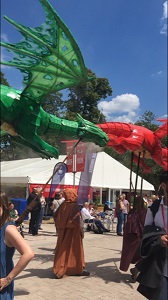I Know What The Medievalists Did Last (and Every) Summer....
2900 medievalists, four days, 750 academic sessions, 2200 papers … and two dragons. It’s fair to say that the Leeds International Medieval Congress (IMC) is quite the event, though it’s far from the only thing in my diary between the end of exams in May and the beginning of the teaching semester in September.
On Sunday 1st July, I was heading to my second IMC as one of those thousands of people congregating in Leeds from all over the world. The bus journey from the airport to the University of Leeds campus puts you in the right mood by taking you past the twelfth-century ruins of Kirkstall Abbey, and before you know it, you’re installed in university halls of residence and introducing yourself to people with ‘I think we follow each other on Twitter?’ (medievalists may be some of the most prolific tweeters in academia).
This year was the 25th IMC. Fittingly, its special thematic strand was ‘Memory but – as ever – papers on ‘any topic related to the Middle Ages’ were welcomed, and I attended panels on topics ranging from pilgrimage to ‘horrific memory’ to nationalism. My own paper was part of a panel called ‘Medievalism in 18th- and 19th-Century Literature in English’. ‘Medievalism’ is an umbrella term covering responses to the Middle Ages since their end, and it can refer as easily to the repurposing of a medieval morality play for Reformation propaganda as to Viking metal music (and yes, there was a panel on that). But then, with five hundred years to cover, medievalism needs to be a broad church.
I spoke about my postdoctoral project, which is funded by the Irish Research Council. I’m looking at how medieval German literature was rewritten in English during the long nineteenth century, and at the moment I’m focusing on translations of the Nibelungenlied, which was written down around 1200, and is one of the best-preserved pieces of medieval German literature. It’s nearly 2400 strophes of love, betrayal, and catastrophic revenge, resulting in a body count which would make George R.R. Martin blush. One of the reasons the Nibelungenlied caught the attention of so many anglophone translators in the nineteenth century was the tendency to describe it (anachronistically) as ‘Germany’s national epic’.


Published: 31 Jul 2018 Categories: The Busy Season

